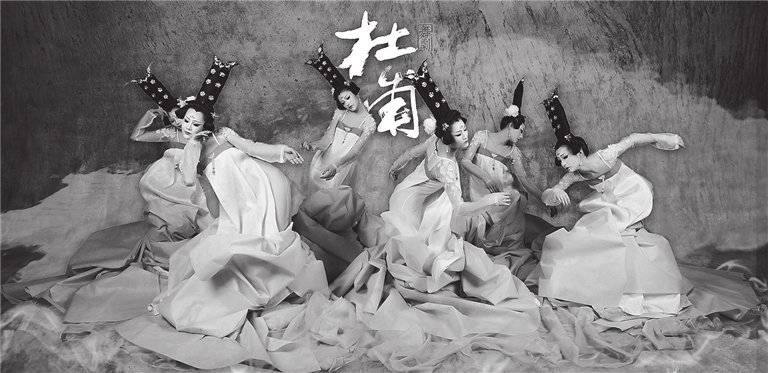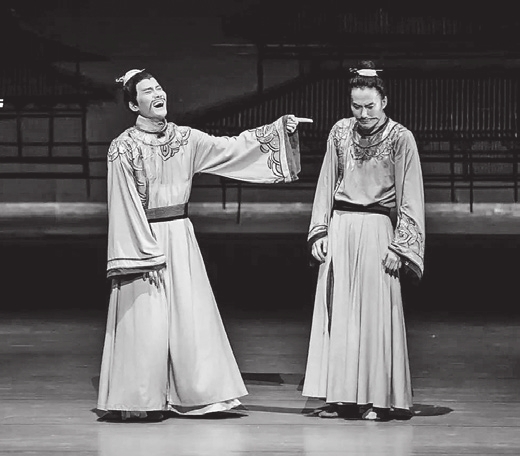


Two great Chinese poets, Li Bai (701-762) and Du Fu (712-770), both acclaimed from their own time to the present, will be featured in two dance shows in Shenzhen later this year. They were the two most prominent figures in the flourishing of Chinese poetry in the Tang Dynasty (618-907), which is often called the “Golden Age of Chinese Poetry.” ‘Du Fu’ Du was also a politician of the Tang Dynasty and his greatest ambition was to serve the country as a successful civil servant, but his life, like the Tang Dynasty itself, was devastated by the An Lushan Rebellion (755-763), and his last 15 years were a time of almost constant unrest. The dance drama “Du Fu” produced by the Chongqing Song and Dance Ensemble describes the poet’s life who maintains his character while caught in the vortex of power and wealth during the Tang Dynasty. It offers hope to people and explores the philosophy of life. The stage designer aims to represent the traditional Chinese culture quintessence through a modern image, and to illuminate the minimalist aesthetic through symbolic visual language on the stage. With lighting to sculpture the space, the design transfers the grandiose, ponderosity, intensity, and solitude of life into the performance. The dance drama uses two actors to emulate the younger Du and the senior one respectively in different eras. The contradictions of these two characters deepen the theme of the performance, which is Du’s love for his country. It highlights the contradiction between Du’s thoughts and social reality by designing contrasting dance movements. “The Beautiful Women,” a famous poem by Du, describes beautiful imperial ladies in the Tang Dynasty. Through writing about their charming gestures and luxury dressing, the poem reveals the corruption of the upper class of the empire during that time. In this dance drama, “The Beautiful Woman” is rendered in an episode, which is an essential part of the whole performance. Time: 8 p.m., Oct. 19 Tickets: 50-580 yuan Booking: WeChat account “GuangmingArtCenter” Venue: Guangming Culture and Art Center, Guanguang Road, Guangming District (光明区观光路光明文化艺术中心) Metro: Line 6 to Fenghuang Town Station (凤凰城站), Exit B ‘Li Bai’ Li was acclaimed as a genius and a romantic figure who took traditional poetic forms to new heights. After a year of fine-tuning and polishing, the dance drama “Li Bai” produced by the China National Opera and Dance Drama Theater returned to stage late last year. From plot structure to music composition, stage settings and costume design, the renewed version of “Li Bai” tells the story of China’s literary giant with a fresh new look. With a contemporary perspective and a script where reality is intertwined with fiction, “Li Bai” unfolds around the literati’s movement between the tangible and the intangible as he struggles between his search for the “Taoist way” and “political influence.” Director Han Baoquan created a stage that reveals Li’s emotional world through choices he makes at key junctures of his life. An aesthetic depiction of the poet’s passion, talent and audacity presents the protagonist who is persistent in his pursuits. Perhaps the most valuable takeaway from the play for an audience member is finding a part of himself or herself in the literary giant. Audience members can get a taste of the great Tang Dynasty as it is presented onstage through poetry, dance and music. “Art has no boundaries. Audience members don’t necessarily need to know the entire life of the character, or understand this person. But they see a Chinese way of expression, a Chinese story and a Chinese cultural atmosphere,” said Yang Yi, project coordinator of the dance drama. Time: 8 p.m., Nov. 6; 3 p.m., Nov. 7 Tickets: 100-580 yuan Booking: WeChat account “PingShanTheatre” Venue: Pingshan Theater, Hekang Road, Pingshan District (坪山区荷康路坪山大剧院) Transport: Take the high-speed rail from Shenzhen North Station to Pingshan Station and then take a taxi(SD News) | 
